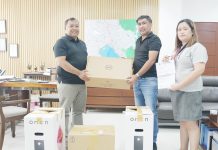PALO, Leyte – In line with the observation of the National Disaster Resilience Month, Plan Philippines presented some invetions that could prove helpful during a disaster.
Five of the 10 innovations from the Visayan regions were from Eastern Visayas which were presented at the ‘Tuklas’ Innovation Labs held at the Oriental Hotel de Leyte, this town, on July 24.
A total of 40 original devices throughout the country were accepted in the Tuklas Innovation Labs which are now under trial stages.
Among them was the “Bakwit Kit”, a flat-packed evacuation kit made from PVC pipes for easy transportation and set-up, designed by DesignNovators from the Philippine Institute of Interior Designers – Eastern Visayas Chapter.
Heidrun Milan, one of the designers of the Bakwit Kit, said that their innovation prototype is being tested in Barangay 77, Tacloban City where residents are helping to enhance their design.
Milan said that they came up with the design as their group’s contribution during a disaster response.
The Bakwit Kit could also fits all the evacuation essentials like soft partition, sleeping mattress, dining set and storage shelving.
It was also design in a way that children, women or even persons with disabilities can easily assemble it.
The Bakwit Kit can fit a family of four, but could still be extended.
“We also would like to promote dignity, convenience and privacy for the families. What we have in the evacuation centers are camp spaces already, so we like to have comfort and convenience for the family because that is very important. Previously we already have issues on privacy and there was no demarcation between one families to another,” Milan said.
Another innovation presented was the Intelligent Flood Warning Monitoring System developed by TECH4DRRM from Cebu City.
The innovation is a flood warning system that uses sensors to send real time alert.
The warning device works when the river water reaches critical level, which the SOLVEX38 will broadcast in the local dialect to inform the community of the time of the possible flooding in the area.
This will allow the residents to set priorities of securing their properties and livestock and evacuate their family to safer place.
The developer of the software said that although they had received assistance from Tuklas, the government should also provide the same to encourage more innovators to create designs that could help communities in disaster preparedness and response.
“Developing this kind of software needs support. We are thankful that Tuklas is here to help us. I hope that the government will come up with a program that will support innovators and inventors to showcase their talents, although there is the Department of Science and Technology but the more government agencies providing fund for the development of innovations and invention which will have a better result because they have good resources,” Jonathan Cartilla, SOLVEX38 developer, said.
Tuklas, which is short for Tungo sa Kahandaan ng Pilipinas, is a community-centered innovation project that aims to support local solutions on disaster risk reduction and management which was launched last year and winners were selected from the 260 proposals from 17 regions in the country.
The selected innovation will be provided with up to P1 million in seed capital, training, and mentorship to test their disaster preparedness innovations from March to November 2018.
“The selected proposals revolve in the four themes of disaster risk reduction and mitigation which are preparedness, mitigation, response and rehabilitation. So, in the innovations that were selected you can see food security, the water, shelter, sanitation and hygiene (WASH) and self-protection,” Michael Anthony Crus, Tuklas project manager, said.
The project is a partnership between Plan International, Action Against Hunger, CARE Philippines, and the Citizen’s Disaster Response Center with support and funding from the Disaster and Emergency Preparedness Program (DEPP) Innovation Labs, a global network of labs funded by United Kingdom aid, and co-managed by Start and Communicating with Disaster Affected Communities (CDAC) Network.
(ROEL T. AMAZONA)



